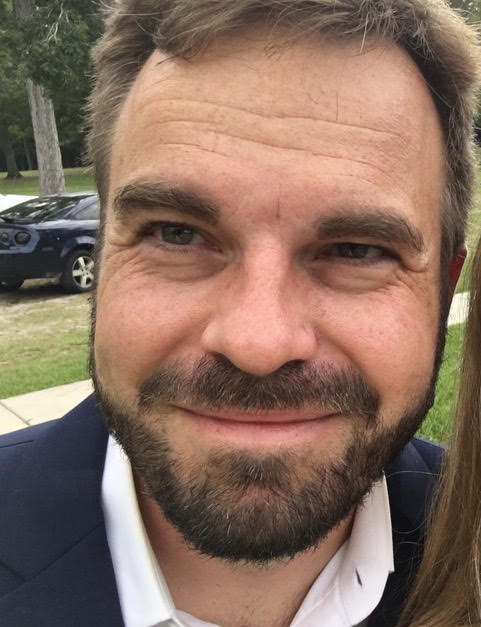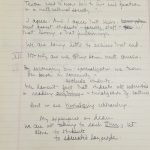
By Alejandra C. Garza, PhD candidate, AHA Career Diversity Fellow 2018-2020
This is the fourth post in a wider series, Navigating the PhD and Beyond: Lessons from the AHA Career Diversity Initiative. The series is presented and curated by Alejandra Garza as part of the AHA Career Diversity for Historians Initiative. As the 2018-20 graduate student fellow, Alejandra’s goal was to show graduate students and professors that the skills developed in a PhD program “are applicable no matter what we do when we leave”. Here Alejandra interviews Dr. Eric Busch. He received his PhD in 2013 with a dissertation entitled, “City of Mountains: Denver and the Mountain West,” supervised by Dr. H.W. Brands. He is currently a Course Manager and Instructor of Record for History, Texas OnRamps.
What motivated you to enter a PhD program? Did your motivations change over the course of the program?
I was motivated to become a history scholar, as I dimly understood that job in my early 20s. I liked the idea of being paid to write and do research, but didn’t have a very deep grasp or understanding of what historians actually did, or how scholarly production in history really takes place.
During my time there, UT’s History Graduate Program was really good at introducing students into certain aspects of the profession—particularly as UT’s faculty perceived and experienced it. So the seminars and colloquia were usually lively and engaging, and gave students lots of opportunities to try on the role of successful academics.
Like many other R1 departments of the era, however, the UT history graduate program put comparatively few resources into training students how to actually get to that level, relying instead on individual thesis advisors to prepare their students for the various hurdles of the job market and pre-tenure. I came out during a series of “down hiring years,” which just turned out to be the new normal.
Near the end of my career as a graduate student, I largely dispensed with the idea of pursuing a tenure track job at any cost, and instead turned my focus to completing the degree and finding a job that I liked.
What do you wish you had learned in graduate school?
Like many students, I did not land a tenure track job out of school. But I did develop a number of marketable skills—primarily self-taught—in order to complete my dissertation as I wanted to write it. I learned how to shoot and produce documentary film, and how to digitize and describe my sources consistent with archival standards—both skills that I use every day as a digital project manager at the Dolph Briscoe Center for American History. I learned to work with statistics and data visualization, and how to turn individual sources into a distance-readable corpora. I taught myself these skills for the most part, but there were a lot of ways/places to learn how to do these things at UT, and I think it’s perfectly fine to expect students to develop these kinds of ancillary historical skills on their own.
However, I really wish I’d had more opportunities to learn project and personnel management as a history PhD student. When I left graduate school and found myself on the non-academic job market in my mid-30s, I had years of graduate training on my resume and a fair number of technical skills, but absolutely no professional leadership experience of any kind. This is a knowledge area that employers care deeply about, and as a working professional, these are the skills l now use most frequently. We tend to dismiss managerial training as extraneous to the discipline, but really, these are areas for which the Department can and should do more to train graduate students. Give graduate students resources to make public-facing projects of various kinds that leverage top-level historical skills. Organize department-sponsored, graduate student-led public history projects, educational projects, historical consulting projects, etc. Partner and pool resources with the Texas Historical Commission, private humanities agencies, corporations, and museums to generate gigs. Go after private funding and public humanities grants to fund a “History+” training program. Give graduate students some undergraduate students to lead and manage. Partner with McCombs to expose them to leading management philosophies, techniques and tools. Then give them some training in how to “talk up” these skills in job interviews. None of this will hurt UT alums on the academic job market, and it can save a lot of time should they end up on a different career path. It’s also a possible route to preserving history as a discipline in what appears to be a permanent environment of scarcity and underfunding.
What was your experience with the initial entry into the job market?
I didn’t really try.
How did you end up in the career you currently have?
I was working in student learning support on campus when a job as a digital project historian came open at the Briscoe Center. I was lucky to land that job, and took over a very large digital project as a manager soon afterward, which is where I began to develop my skills as a supervisor and project leader. That led to additional opportunities both at the Briscoe Center, and at the job I currently have running the History course for UT OnRamps.
If COVID-19 has impacted or even taken your job in these difficult months, please share that with us, too.
I’m lucky to still have jobs at both OnRamps and the Briscoe Center. So I don’t have much to add here, other than that I see Covid-19 as an accelerant to already existing market trends—none of which bode well for the financial future of the humanities.
Any other advice you have for new PhDs entering the job market?
No. They get enough advice. My advice is for the current stewards of the discipline. We need to find ways to make this profession viable for an upcoming generation of students who want to practice and produce history, but who won’t ever see a fraction of the institutional resources that today’s faculty enjoy. That means transforming the institutional framework the underlies the discipline, from graduate training to single-author culture, the glacial pace of peer review, insane tenure and promotion practices, and much more. There will always be historians. But if our discipline doesn’t adapt, we probably won’t be the ones training them anymore.
This blog series was created by Alejandra C. Garza with assistance from Dr. Alison Frazier and Dr. Michael Schmidt as part of the AHA Career Diversity for Historians Initiative 2018-2020.

Dr. Eric Busch received his Ph.D. in 2013 with a dissertation entitled, “City of Mountains: Denver and the Mountain West,” supervised by Dr. H.W. Brands. He is currently a Course Manager and Instructor of Record for History, Texas OnRamps.
The views and opinions expressed in this article or video are those of the individual author(s) or presenter(s) and do not necessarily reflect the policy or views of the editors at Not Even Past, the UT Department of History, the University of Texas at Austin, or the UT System Board of Regents. Not Even Past is an online public history magazine rather than a peer-reviewed academic journal. While we make efforts to ensure that factual information in articles was obtained from reliable sources, Not Even Past is not responsible for any errors or omissions.



